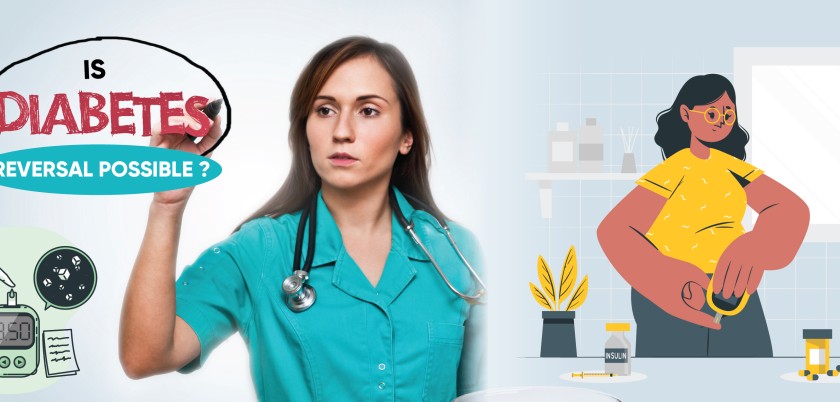
Is diabetes reversal possible
Research proves that although there is no cure for this deadly disease, but a person can go into remission - complete remission (where glucose levels return to non diabetes range) or partial remission (where blood glucose levels return to pre diabetes range). It has been observed that sustained remissions can be obtained by type 2 diabetics if sufficient weight is lost within six years of diagnosis., which may be obtained by lifestyle changes, dietary changes, surgery (bariatric surgery) and/or medical treatment. Weight loss leads to extended life expectancy for those suffering with type 2 diabetes and if an obese person loses 15 kg, diabetes remission occurs with total biochemical remission and restoration of beta cell function to producing sufficient insulin to manage body's glucose levels. Even if after losing many kilos, a person doesn't go into remission, still weight loss adds to various health benefits such as - dose reduction of oral hypoglycaemic drugs, better blood glucose levels and a lower risk of complications. Remission is a good technique, if achieved, as it gives a strong sense of personal achievement and empowerment and it also lowers the burden on the medical system as patients no longer need drugs for lowering sugar levels.
If HbA1c is below than 6.5% and stays here for at least three months without continuing the prescribed oral hypoglycaemic drugs, it is the main defining measurement of diabetes remission. An alternate criterion is fasting blood glucose levels below 126 mg/dL. But the most reliable and simplest method is HbA1c.
Remission doesn't mean that you are no more a diabetic or your diabetes is cured. Diabetes is a lifelong condition which means you might be in remission stage where your blood sugar levels stay in a non diabetic range and you no longer need diabetic medications, but there is always a chance for the symptoms to reappear. Its quite possible that you might stay without symptoms for longer years. But remission simply implies that the diabetes is under control, but you have to follow all those lifestyle changes that a diabetic has to follow.
The base criterion to get remission is very low calorie restriction (VLCR) leading to weight loss.
Ways to lose weight -
• Low calorie diet - Studies have shown a direct link between low calories and diabetes remission. Also work on a low carbohydrate diet to achieve maximum benefits.
• Physical exercise - Complement your low calorie diet with physical activity to achieve maximum benefits. Both calorie deficit in diet and calorie burning by workout help to achieve diabetes remission.
• Bariatric surgery - Weight loss surgery helps in weight loss by changing the stomach and digestive system to limit the eating capacity. Gastric bypass and gastric sleeve surgery have long term results than gastric binding. Almost 84 percent of diabetic patients observe complete remission of type 2 diabetes mellitus even before they lose significant weight.
• Therapeutic Fasting - Therapeutic fasting provides the benefits of calorie restriction along with hormonal benefits as are achieved by bariatric surgery, without any surgery involved. Therapeutic fasting is controlling the consumption and quantity of calorie dense foods and beverages for a specified time period. Fasting period allows the consumption of very low calorie beverages such as tea, coffee or water. For micronutrients, a supplement is usually provided by the diabetologist. Under supervision, this is also a good strategy to cause remission of diabetes.
So it is a possible and practical target to achieve a remission to a non-diabetic state and elimination of anti-diabetic drugs through substantial weight loss, but it is rarely recorded and probably under reported. Bottom line is that weight loss is what really matters with diet and persistence.






